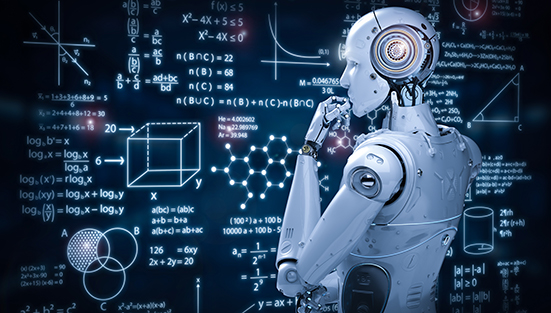
Artificial Intelligence: The Domain Where Machines Are More Intelligent
Artificial intelligence (AI) is an extensive field of computer science and robust datasets that emphasizes the development of intelligent machines by simulation of human intelligence capable of performing various tasks. It also encloses sub-fields of machine learning and deep learning, often referred to in concurrence with artificial intelligence.
What is the current stage of Artificial Intelligence(AI)?

Before diving into the future of AI, let us understand where Artificial intelligence lies at present. As we say, AI is a computer-controlled robot that replicates human intelligence to perform tasks.
AI technologies can be divided into three types based on their capabilities to mimic human characteristics with their real-world applications and the theory of mind:
Artificial Narrow Intelligence (ANI): Capabilities with a limited range.
It refers to an intelligence technique that is goal-oriented and intelligent enough to complete single tasks. Humans have only succeeded in realising this form of artificial intelligence. It is also categorized as weak or narrow AI at times.
Artificial General Intelligence (AGI): Capabilities comparable to humans.
It refers to a machine displaying human intelligence, also known as strong or deep AI.
Artificial superintelligence (ASI): Capable of outperforming humans.
It is a hypothetical or self-aware AI with cognitive abilities that replicate or understand human intelligence or behaviour and exceed human intelligence’s capacity.
Currently, AI is classified as Narrow AI or weak AI, which can only perform specific tasks that have been programmed into it, such as facial recognition, speech recognition/voice assistants, self-driving cars, internet searches, etc.
How can you classify artificial intelligence?
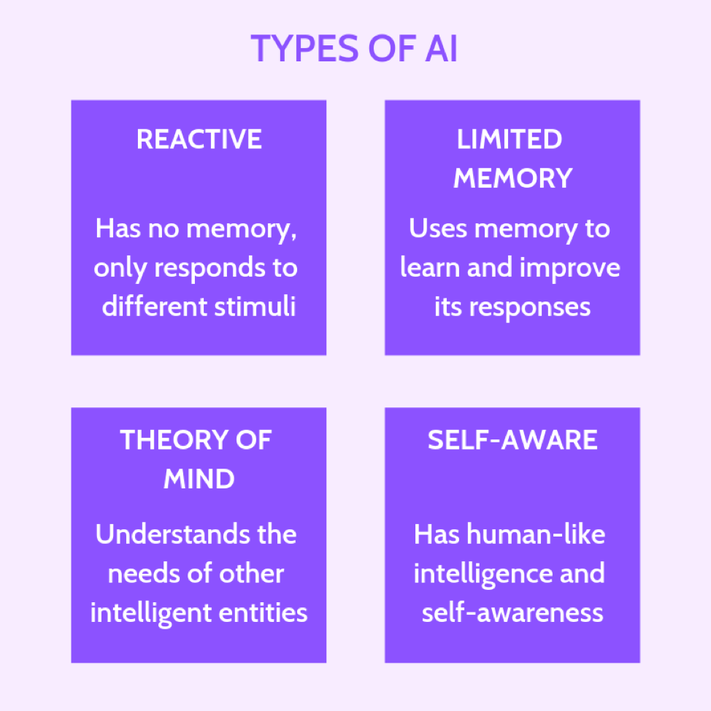
Artificial Intelligence is divided into AI and AI-enabled machines based on their “likeness” to the human mind and ability to work and think like humans. AI or AI-enabled systems are classified into four types, according to this:
- Reactive Machines
- Machines with Limited Memory
- Theory of Mind
- Self-Aware AI
To cite a few commonly used Artificial Intelligence:
- Assistants Siri, Alexa, and Google
- Autonomous vehicles
- Robo-advisors
- Spam filters for email
- Netflix’s suggestions
- Bots that converse
Future of AI: The Change world is going to witness.
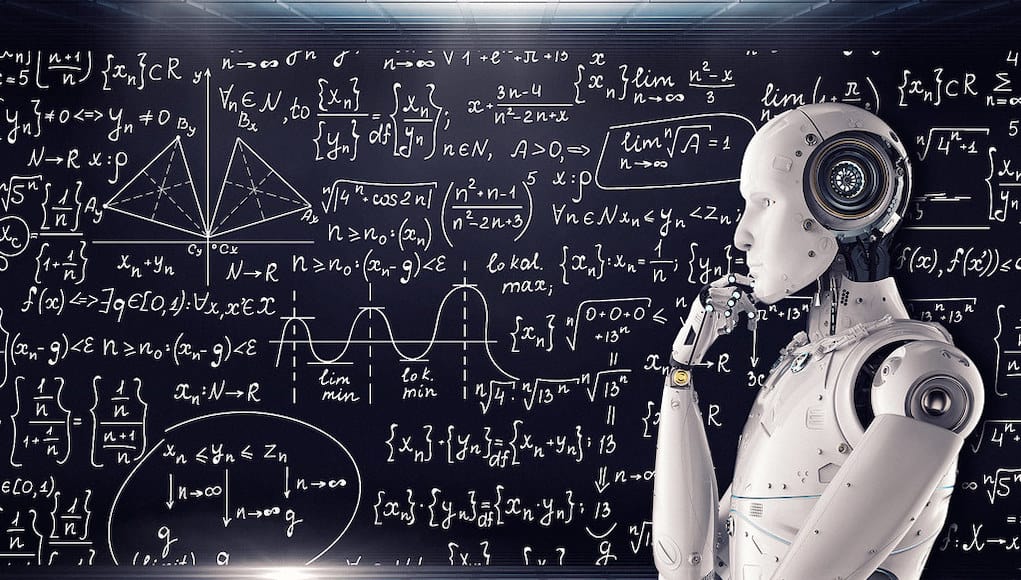
The future of every industry and human being is going to be influenced by AI. Artificial intelligence has been a critical component in developing new technologies such as big data, robotics, and the Internet of Things (IoT). It will continue to function as a technological innovator in the inevitable future.
Because many of us associate AI with science fiction fantasies or fear of robots with human-like characteristics taking over the world, depictions of AI have permeated the media. While no one can predict how it will evolve in the future, current trends and developments paint a different picture of how AI will enter our lives.
This technology is progressing at a rapid pace. However, it was not as flat as a pancake as it appeared. It has taken several years and a lot of effort, hard work, and contributions from many different people to get AI to this point.
Because AI is such a revolutionary technology, there are many questions about its future and impact on human lives. It’s risky, but it’s also an excellent opportunity for the future. AI will be used to improve both defensive and offensive cyber operations. Furthermore, newly developed cyber-attacks take advantage of specific AI technology vulnerabilities.
In this section, we will discuss the future of AI and its implementation in various sectors as a boon to technology and its impact on humans.
Advancement of Artificial Intelligence and its future!
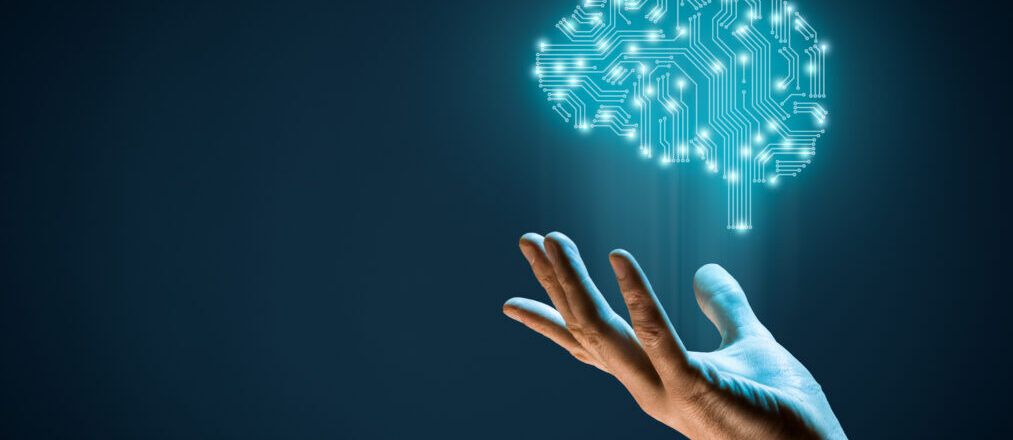
It is a sturdy task to achieve superintelligence by 2100.
We can’t rule out the possibility of superintelligence occurring. Several surveys have been conducted in which AI researchers and experts were asked how many years from now they believe we will have human-scale AI with a 50% chance. These surveys and studies all conclude: The world’s top experts disagree; it could happen in decades, centuries, or never, but nothing has been confirmed. As a result, we don’t know.
AI could be programmed for devastation.
Autonomous weapons are AI systems that are designed and programmed to kill. In the hands of the wrongdoers, autonomous weapons could arbitrarily lead to an AI war with mass casualties, potentially resulting huge loss of humanity.
This risk of facing difficulties to “turn off” or “deactivate” the weapons exists even with narrow AI. It may result in humans losing control over the system. However, it increases exponentially as autonomy increases.
AI is ready to take over various segments of human jobs.
Job automation will widen economic divides and cause social upheaval. The efficiencies and other financial benefits of code-based machine intelligence will continue to disrupt all aspects of human work – and in many cases, they are already doing so. However, viewing this as a clear-cut shift from humans to machines is greatly exaggerated. With the advancement of AI, a revolution has occurred in every industry, and people are fearful of losing their jobs.
However, AI has increased the number of jobs and opportunities available to people in all fields. Every machine requires a human to operate it. However, while AI has taken over some roles, it is reverting to creating more jobs for people.
Super-intelligent Computers and Automated robots will surpass human intelligence and ability.
Superintelligence has long been the stuff of worldly science fiction, with robots overrunning, overthrowing, and enslaving humanity. We are more interested in Narrow AI, which performs a specific task and improves its performance. However, the concepts of artificial superintelligence and general AI have not yet been developed, and research is ongoing.
Furthermore, by replicating human intelligence’s multifaceted intelligence, Super AI could theoretically outperform us in everything we do: mathematics, science, art, sports, medicine, hobbies, emotional relationships, etc. Super Artificial Intelligence would have a more significant memory and a faster data analytics and stimuli ability. As a result, super-intelligent beings’ decision-making and problem-solving skills would far exceed humans’.
Dependence lock-in Automated machines:
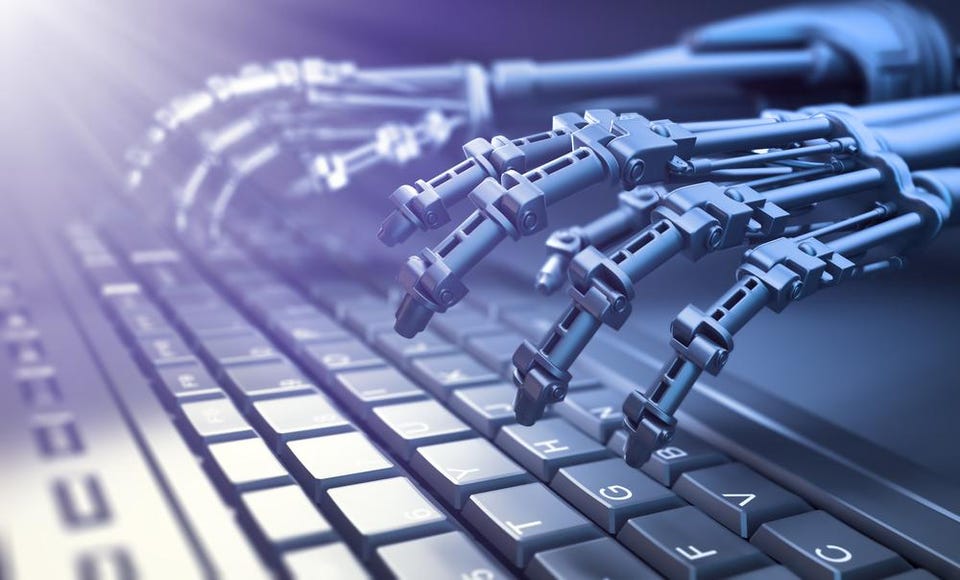
Many people regard Artificial Intelligence as a growing human capability. Nonetheless, some predict that people’s increasing reliance on machine-driven networks will erode their analytical, social, and survival skills, eroding their ability to think for themselves and act independently of automated systems and interact effectively with others.
Human intervention in AI operation.
People may believe that AI does not necessitate human intervention. However, AI has not yet been developed or programmed to make its own decisions. Before presenting the final AI model, a machine learning engineer must pre-process the data, prepare the models, prepare a training dataset, identify and eliminate bias and variance, and present the final mode/set. Each AI model is still reliant on humans for proper operation. However, once the model is operational, it improves its performance based on its experiences.
Future impact of AI in various sectors
Medical and healthcare services

The benefits of employing AI in medicine are already being researched. The healthcare industry has a wealth of data that may be used to create predictive models in the field. In the comparatively AI-nascent healthcare sector, diseases are more quickly and reliably identified, medication discovery is accelerated and streamlined, virtual nursing aides monitor patients, and comprehensive data analysis aids in providing a more tailored patient experience. AI will play a critical role in quickly and effectively diagnosing ailments in the healthcare industry. New drug discoveries will be faster and more cost-effective with the assistance of AI. It will also increase patient participation in their care, make appointment scheduling more accessible, and prevent billing issues.
Cyber Security and Defense.
Without a doubt, ensuring data security is a top responsibility for every organization. The following are some predictions on how artificial intelligence will affect cyber security:
- AI technology will be used to track security incidents.
- NLP can be used to locate the source of cyber-attacks.
- With the help of RPA bots, you may automate rule-based tasks and procedures.
However, as intelligent technology, attackers can also use it as a threat. They can misuse AI by automating attacks that are difficult to defend. Also, AI and machine learning will be critical technologies for detecting and anticipating threats in cyber security.
Autonomous Vehicles and Transportation
We’re already seeing how AI is changing the realm of transportation and autos with the introduction of autonomous vehicles and autonomous navigation. Although researchers are working in the automobile industry, has yet to build a fully autonomous vehicle. Artificial intelligence and machine learning are utilized in the cockpit to reduce effort, control pilot stress and fatigue, and improve on-time performance. AI will have a significant impact on manufacturing, especially in the automotive industry. Autonomous automobiles will transport us from place to place one day, even though perfecting them could take a decade or more.
Employment and Jobseeker.
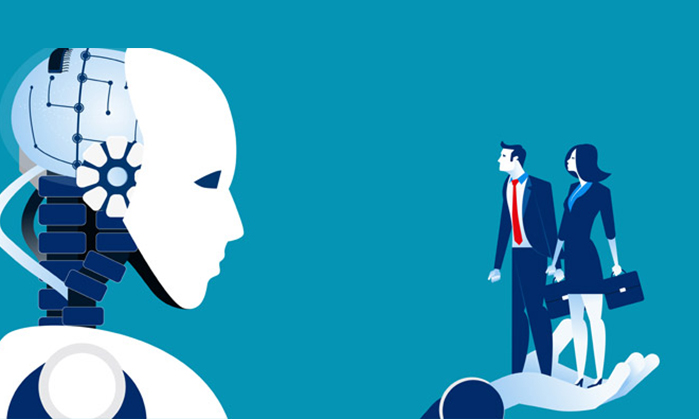
Artificial intelligence (AI) can drastically alter the job search and hiring process. Artificial Intelligence has made it easier for job searchers and companies to find work. AI is already being used in the job market, with strict laws and algorithms that immediately reject a CV if it does not satisfy the company’s needs. The majority of AI-enabled applications are expected to drive the job process in the future, spanning from interview scoring to telephonic rounds.
Various AI applications, such as Rezi, Jobseeker, and others, are supporting job seekers in developing excellent resumes and locating the ideal place for their abilities.
E-commerce and marketing:
AI is becoming the norm in all organizations, not just in the tech sector.
Artificial intelligence will play a critical role in the e-commerce industry shortly. It will benefit every aspect of the e-commerce industry, from user experience to product marketing and delivery. We can expect e-commerce to include automated warehouse and inventory management, shopper personalization, and the use of chatbots in the future. One of the most notable artificial intelligence examples applications, marketing, has been a critical area for advancement and recent AI trends.
The early 2000s were not particularly promising in terms of AI’s application in the online marketing arena. With the advancement of AI, web users may soon be able to purchase items simply by taking a picture of them. Furthermore, AI has made its way into various marketing tools and technology to help marketers calibrate and thoroughly analyze large amounts of data. The use of AI in the marketing industry has increased productivity by removing the burden of performing boring and mundane tasks.
Finance and banking
Many banks have already implemented artificial intelligence-based systems or software to provide customer support and detect anomalies and credit card fraud. Fraud detection is another application of AI in banking that is significantly more valuable to banks. Humans may struggle with pattern recognition, but machines excel at it. This is where artificial intelligence (AI) for fraud detection comes in. By tracing card usage and endpoint access, security experts can more effectively prevent fraud.
Businesses use AI to track those phases by analyzing transaction behaviour. Because of its ability to diagnose large amounts of data and forecast and prevent fraud, AI will be a powerful tool for financial security.
Will Artificial Intelligence Usurp Human Intelligence?
Almost every business is expected to be impacted by artificial intelligence in the long run. Artificial intelligence is already present in our smartphones, automobiles, healthcare systems, and favourite apps, soon permeating many other industries.
Wrapping Up
The distinction between computer programs and artificial intelligence is hazy. It’s pretty simple to mimic certain aspects of human intelligence and behaviour, but building a machine version of human consciousness is an entirely different issue. While artificial intelligence is still in its infancy, and the goal of strong AI has long been dismissed as science fiction, recent advances in machine and deep learning imply that we should be more optimistic about achieving it in our lifetimes. It isn’t comforting to think about a world in which machines outperform humans at the fundamental things that make us human. It’s not easy for us to anticipate AI’s consequences for our planet.

Comments